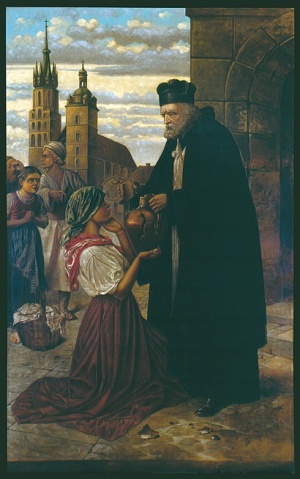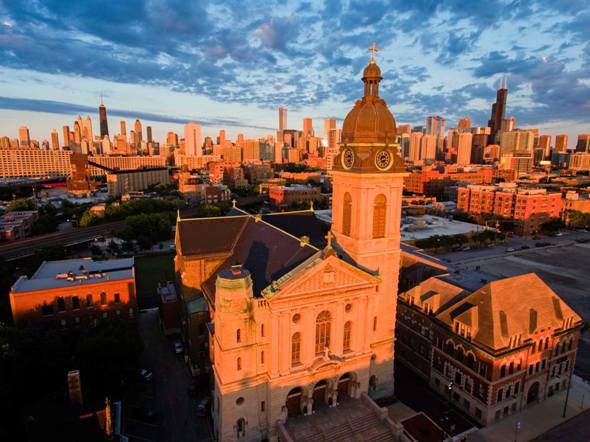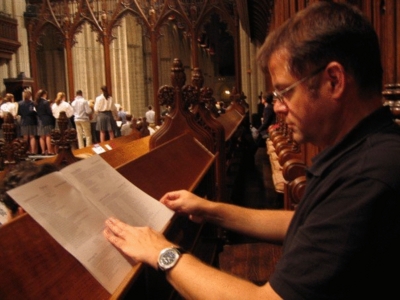Freshening Chicago early-music scene, native son leads vocal quintet His Majestie’s Clerkes
Preview: His Majestie’s Clerkes debut concert, 7:30 p.m. Aug. 13, at St. John Cantius Church.
By Nancy Malitz
Resounding at sunset in the shadow of Chicago’s Magnificent Mile, a new all-male vocal ensemble called His Majestie’s Clerkes is making its debut at St. John’s Cantius as part of Chicago’s rapidly expanding early music scene.
Does the name of this fledgling group sound familiar?
There is an intriguing old twist to this new development, and if you were a Chicagoan back in the 1980s, you might already have guessed it.
The founder is countertenor and conductor Richard Childress, who once founded, conducted and sang in a different Chicago ensemble of the same name. That old group eventually morphed into a professional choir of men and women who perform music of all kinds, now well known as Bella Voce.
Meanwhile the native Chicagoan Childress found himself gobsmacked by the recordings coming out of England’s vibrant early music scene, and he eventually headed to the other side of the Atlantic to soak up the tradition. Since then, Childress has pursued an international career of singing, conducting and coaching while maintaining his position as a countertenor in the venerable Winchester Cathedral Choir.
When I caught up with Childress by telephone, he explained that the idea of forming a new conductorless group, a small ensemble of professional male voices, began to take hold when he realized that Chicago had become quite nurturing to early music. The city has recently attracted some of the nation’s top-notch instrumentalists to relocate, although Childress as yet finds no vocal ensemble like the one he has envisioned. Having organized other groups, trained other singers and mastered a great deal of repertoire, he said, “the time just seemed right to give something back.”
Note: Advance tickets are available online but it’s cash only at the door.
His Majestie’s Clerkes will perform at St. John Cantius, a splendid Baroque church built in the late 19th-century Polish immigrant neighborhood directly west of Chicago’s historic Water Tower. “The church is a special place with extraordinary acoustics and a devoted, music-loving parish,” said Childress. “The music we will sing is ideally suited. We had our first rehearsal (on Aug. 11) and the guys sounded absolutely fantastic.” Childress will be joined by tenors Nathaniel Adams and Matthew Dean, and basses Michael Hawes and Jay Tuttle.
With Childress as countertenor, plus two tenors and two basses, the five-voice mix is a good fit for much English and European Renaissance music, and for some contemporary music, too. “We may add one more countertenor, and occasionally sopranos when the repertoire calls for it, but we’re going to keep the group small, with the best singers I can find from Chicago, New York and England,” Childress said.
 Frequent organ recitals, sacred choral music and Gregorian chant are also part of the musical mix the year round at St. John Cantius, which is named after one of Poland’s holy men, St. John of Kenty, born in 1390 in the small village of Kenty (Kęty), about 50 miles west of Kraków. The devoted teacher of philosophy and theology was declared a saint in 1676.
Frequent organ recitals, sacred choral music and Gregorian chant are also part of the musical mix the year round at St. John Cantius, which is named after one of Poland’s holy men, St. John of Kenty, born in 1390 in the small village of Kenty (Kęty), about 50 miles west of Kraków. The devoted teacher of philosophy and theology was declared a saint in 1676.
Childress devised the inaugural concert in two parts. The first features beloved 15th- and 16th-century works devoted to the Virgin Mary, among them Josquin’s exquisite “Ave Maria gratia plena” and Dufay’s “Alma Redemptoris Mater,” which are likely to sound familiar even if they are not recognized by name, so quintessential are they to that historical era.
On the second half, Childress has selected some interesting modern settings of the biblical “Song of Songs,” that passionate love poetry which the Jewish and Christian devout have come to perceive as an allegory of the love between God and Israel, or between Christ and the Church.
One of the composers Childress has selected is London-born Ivan Moody, 52, who is known for writing spiritually-based music that’s rooted in ancient modes and infused with lush harmonies. It sounds both contemporary and mystical. Another is British composer Howard Skempton, born in 1947, whose music is deeply calm, repetitive and quite hypnotic, grounded aesthetically in minimalism. To get an idea of the music of these two composers, watch below.




